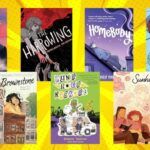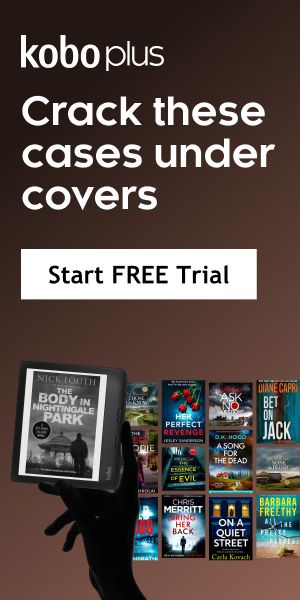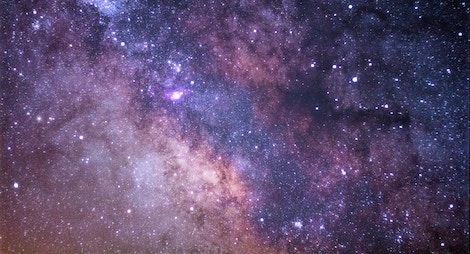
30 Top Sci-Fi Books on Goodreads
“What are the top sci-fi books?” is a question I’ve heard more than once from someone looking for a guide to the best of such a complex, varied, and multitudinous genre. It’s actually not a question that’s easy to answer (top according to what metrics? And according to whom?) but one worth trying to. So that’s what I did, looking to see the top sci-books according to Goodreads users.
How did we choose the top sci-fi books?
This list isn’t scientific, and I certainly didn’t do any math. Instead, following the model of a previous post on top fantasy books, I spent hours poking around on Goodreads to see what books representing the breadth and scope of science fiction rose to the top. To qualify as top sci-fi books and be included on this list, volumes must have an average rating of 4 out of 5 stars and have been rated at least 4,000 times. From there, I aimed for a mix of sub-genres, publication time periods, author backgrounds, and other factors.
The result is a bunch of widely and enthusiastically beloved science fiction books. If you’re new to the genre or want to explore new corners of its galaxy, this list of some of the top sci-fi books out there—according to one particular, idiosyncratic deep-dive on Goodreads—is a great place to start.
A couple of notes:
- I’ve only lightly categorized because, while there are a lot of great sub-genres in sci-fi, the boundaries between them are exceedingly fuzzy.
- After each title, you’ll find a parenthetical notation arranged like this: (Average Rating – Number of Ratings).
- You’ll probably browse the list below and think to yourself, “Why is That Book by My Favorite Author not on the list?!” And that’s okay. Write a comment below about That Book and why you love it.
Okay, here we go with the top sci-fi books!
Top Classic Science Fiction Books
With “classic” defined, basically, as “published in the 20th century and still regularly discussed.”
The Ultimate Hitchhiker’s Guide to the Galaxy by Douglas Adams (4.38 – 257,751)
I was actually kind of disappointed this one didn’t clock in at 4.2 stars.
Lilith’s Brood by Octavia Butler (4.33 – 12,363)

Unsurprisingly, Butler’s books are frequently and highly rated on Goodreads. This one—a collection of three volumes (Dawn, Adulthood Rites, and Imago) previously published as Xenogenesis—is one of the most popular. Like most of Butler’s books, it builds an incredibly rich and fascinating world, which the author uses to explore race, gender, sexuality, and more.
2001: A Space Odyssey by Arthur C. Clarke (4.14 – 214,170)
Unusually, 2001: A Space Odyssey was written at the same time as the screenplay to the film of the same name (which was co-written by Clarke and director Stanley Kubrick) and was actually released after the movie’s premiere. The absolutely iconic status the film holds in 20th century sci-fi cinema also clearly lodged the novel in the collective memory (of Goodreads reviewers, at least).
Dune by Frank Herbert (4.21 – 510,994)
If I’m honest, everything I know about Dune can be summarized in one word: “sandworm.” That might not be fair, but it actually speaks well of the book and its legacy: I can’t name many other imaginary creatures introduced in science fiction novels, after all, but “sandworm” is super-familiar. Which may explain why so many people love this book and the five sequels and film and television adaptations it spawned.
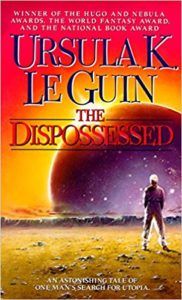 The Dispossessed by Ursula K. Le Guin (4.21 – 70,474)
The Dispossessed by Ursula K. Le Guin (4.21 – 70,474)
It was a toss-up whether to include The Dispossessed or The Left Hand of Darkness on this list, but the former eked out a higher average rating than the former, so here we are. The Dispossessed, like a lot of the best sci-fi, is about technology but also and more importantly about political philosophies and how they affect the worlds that birth them. And in the way of complex sci-fi series, The Dispossessed was the fifth novel in Le Guin’s Hainish Cycle but takes place first, chronologically speaking. So you could have a ton of fun reading the series in different orders and being a huge nerd about it.
A Wrinkle in Time by Madeleine L’Engle (4.01 – 876,850)
Your childhood has been vindicated, if only barely (I was surprised by the relatively low 4.01 average rating). This classic of weird, fantastical science fiction has some extremely fun names, many of which—Mrs. Whatsit, Mrs. Who, Mrs. Which, and the non-name but name-like Tesseract—I’ve previously recommended as awesome literary cat names.
1984 by George Orwell (4.17 – 2,559,807)
Everyone’s favorite political cudgel and advertising reference started as a novel about political power, free speech, and the effects of media technology. It’s also the earliest book on this list (Frankenstein and The Time Machine didn’t qualify).
The Sparrow by Mary Doria Russell (4.17 – 41,819)
Aliens! Jesuits! What else do you need to know? Fine, I’ll tell you more. The Sparrow is the first book in a classic ’90s duology. The other volume, Children of God, qualifies as top sci-fi too, according to these standards. It won all the awards (James Tiptree Jr. Award, Arthur C. Clarke Award, British Science Fiction Association Award…) and tells the story of a secret Jesuit mission to an alien civilization, cleverly playing with the histories and possible futures of imperialism and religion.
 Cryptonomicon by Neal Stephenson (4.25 – 90,748)
Cryptonomicon by Neal Stephenson (4.25 – 90,748)
I knew a Stephenson title belonged on any list of the top sci-fi books, but it was tough to pick a novel by the king of cyberpunk. Snow Crash, Anathem, The Confusion, The System of the World all technically qualified. But Cryptonomicon is one of the highest rated and—in its careening between past and present, in its obsession with secrets and technology, and in its dizzying 1000+ pages—really captures what Stephenson’s cyberpunk is all about.
Doomsday Book by Connie Willis (4.03 – 42,740)
Willis has written some classic time travel fiction (a couple of which, To Say Nothing of the Dog and All Clear, cleared the 4-star threshold). Doomsday Book was first, and it really shows what magic Willis could cast with a time machine, the humans behind the technology, and an interesting historical setting (plague-ridden Europe in this case).
Top Sci-Fi Books of the 21st Century
Leviathan Wakes by James S.A. Corey (4.24 – 123,697)
This novel launched the very popular The Expanse series, with eight well-loved novels: Leviathan Wakes, Caliban’s War, Abaddon’s Gate, Cibola Burn, Nemesis Games, Babylon’s Ashes, Persepolis Rising, and Tiamat’s Wrath. Set in a world with off-planet colonies but where humans are restricted technologically to our solar system, Leviathan Wakes has both thoughtfulness about social structures and a ton of exciting action. In 2015, it was adapted into the SyFy series The Expanse, which is moving to Amazon Video for its upcoming season.
Shades of Grey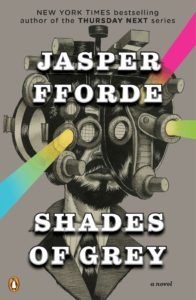 by Jasper Fforde (4.14 – 29,927)
by Jasper Fforde (4.14 – 29,927)
Fforde chose an unfortunate name for this book, given that two years later a wildly popular book would come out and completely torpedo this one’s searchability. But despite being a little hard to find when you stick its title in a search bar, Shades of Grey is a must-read. It’s spectacularly strange and fantastically fun, set in a richly imagined world where how you see color determines your social status.
The Gone-Away World by Nick Harkaway (4.12 – 10,675)
In a post-apocaplyptic future, where strange bombs have turned much of the world—including many of its people—into masses of “Stuff,” a nameless narrator is hired to put out an unusual fire. Drama, and hijinks, ensue. The Gone-Away World is the most beloved (on Goodreads, at least) of Harkaway’s many novels.
Ancillary Sword by Ann Leckie (4.05 – 33,619)
This is the second of the Imperial Radch series, a follow-up to the Hugo, Nebula, and Clarke Award–winning Ancillary Justice. In the series, Leckie explores empire, technology, gender, and more, Leckie imagines a civilization that does not mark gender (using female personal pronouns for everyone) and follows an AI who was once a ship but is now in a single body.
Raven Strategem by Yoon Ha Lee (4.16 – 4,504)
This is second and most-reviewed book in the Machineries of Empire trilogy, also including Ninefox Gambit and Revenant Gun. Large-scale military sci-fi in which an imperial calendar rules the universe (or at least a portion of it), Raven Strategem and the rest of the series has been critically acclaimed and loved by fans. Both Raven Strategem and its predecessor in the series were nominated for Hugos.
Warcross by Marie Lu (4.19 – 54,390)
This delightful and engrossing book represents a cluster of game-within-a-book novels that have come out in recent years and formed a new little sub-sub-genre, with connections to cyberpunk but an aesthetic all their own. Like other books of this type—Ready Player One being another popular example—Warcross focuses on a hugely popular game and the (extra)ordinary person who discovers its secrets.
 Binti: Home by Nnedi Okorafor (4.14 – 12,250)
Binti: Home by Nnedi Okorafor (4.14 – 12,250)
The second in Okorafor’s Binti series, which takes place a year after the first, finds the main character Binti returning to home to Earth after ending a galactic war. As is the case with all of Okorafor’s books, Binti: Home defies generic categories in all the best ways. Binti: Home was a Hugo finalist in 2018.
All You Need is Kill by Hiroshi Sakurazaka (4.06 – 15,189)
Remember that weird Tom Cruise movie Edge of Tomorrow? Well, that story—of a soldier who dies over and over again, stuck in a loop on the day of a big battle—started its life as an acclaimed 2004 novel from Japanese author Hiroshi Sakurazaka. Translated into English and published in the U.S. in 2009, All You Need is Kill is light, action-packed, and clever.
Old Man’s War by John Scalzi (4.24 – 135,103)
In the future, Earth isn’t so central to human life anymore, and its inhabitants have barely any idea what’s going on in the rest of the universe, where humans (in the form of the Colonial Union and the Colonial Defense Force) fight aliens for planets. Earthlings, and Americans in particular, can sign up to join a secretive space army when they turn 75, which is what the protagonist of this book does. Old Man’s War launched a series with six novels and a bunch of other texts. A few of the other Old Man’s War series novels (The Ghost Brigades, The Last Colony, and The Human Division) qualify with 4+ stars based on 4,000+ratings.
More Happy Than Not by Adam Silvera (4.06 – 29,015)
Eternal Sunshine of the Spotless Mind meets queer YA sci-fi? Yes, please.
An Unkindness of Ghosts by Rivers Solomon (4.03 – 4,752)
I remember this book as one of the buzziest, most talked-about top sci-fi books of 2017. An Unkindness of Ghosts uses the structure and life of a generation ship to explore questions of race, segregation, and survival. In doing so, Solomon works in the critical sci-fi tradition of Octavia Butler, Ursula K. Le Guin, and Samuel R. Delaney while crafting a story all their own.
Best Sci-Fi Book Series
I focused on trilogies for this section of the list. To qualify, every book in a sci-fi trilogy had to meet the 4+ stars/4,000+ ratings threshold.
 The Long Way to a Small, Angry Planet by Becky Chambers (4.17 – 48,677)
The Long Way to a Small, Angry Planet by Becky Chambers (4.17 – 48,677)
Chambers’s Wayfarers series is a 2019 Hugo nominee for Best Series, which maybe isn’t a surprise when you see these numbers. The three books, all set in the same world, have a couple of characters and some overriding themes in common but work just as well as standalone books. Oh, and they’re totally amazing. This one is, in my own opinion, the most rip-roaring fun of the three, with Firefly vibes, great characters, and an exciting plot.
A Closed and Common Orbit by Becky Chambers (4.36 – 21,792)
I’m intrigued that it’s this volume is the highest-rated of the three. I mean, it’s my favorite, too. But it’s also—by far!—the darkest of the series and the most experimentally structured, neither of which would seem to guarantee top marks across the board. So good on you, Goodreads.
Record of a Spaceborn Few by Becky Chambers (4.17 – 9,670)
In the last of the Wayfarers books, Chambers focuses the thoughtful, anthropological eye she used in the first two books on a single civilization of humans who long ago fled earth and reimagined their humanity in the process. She explores what happens to a distinctive culture when it interacts with a variety of others and when a disaster calls its rituals and habits into question.
The Three-Body Problem by Cixin Liu (4.05 – 89,618)
This is the first book in the Remembrance of Earth’s Past series by one of the most popular science fiction authors in China. There’s physics, political turmoil, a strange role-playing game, a series of mysterious suicides, and more. This book was a phenomenon in the U.S. after its translation and release, helping launch a broader interest in Chinese sci-fi in translation embodied recently by collections like Invisible Planets and Broken Stars, both edited by Ken Liu.
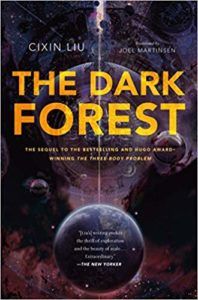 The Dark Forest by Cixin Liu (4.41 – 38,746)
The Dark Forest by Cixin Liu (4.41 – 38,746)
An alien invasion is coming and all human information has been compromised. This book follows a project designed to use puzzles and secrecy to foil the invasion and save humanity.
Death’s End by Cixin Liu (4.45 – 28,574)
This is an unusual sci-fi series in that the average rating goes up book by book (most either decline steadily or jump all over the place). A tentative peace between humans and an alien civilization is thrown into jeopardy in this conclusion to the Remembrance of Earth’s Past series.
The Hunger Games by Suzanne Collins (4.33 – 5,691,964)
Five-and-a-half MILLION ratings? I mean, it’s not entirely surprising, given what a big deal these books and their movie adaptations were. But still. That’s a lot of people weighing in, with more than half (54%) giving it 5 out of 5. This stylish YA dystopia, in which “tributes” from provinces of the former U.S. fight to the death for the delight of those in power, was all anyone talked about for a few years. And it shows.
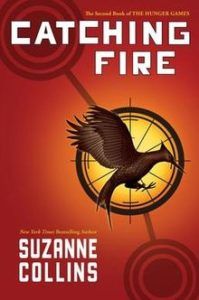 Catching Fire by Suzanne Collins (4.29 – 2,184,681)
Catching Fire by Suzanne Collins (4.29 – 2,184,681)
This second book in the Hunger Games series shows the start of an organized resistance to the sacrificial-murder-by-reality-television regime established in volume one.
Mockingjay by Suzanne Collins (4.03 – 2,057,641)
Despite this not being the one called “Catching Fire,” this is the book where it all burns down. So full of action it had to be made into two movies instead of just one, Mockingjay is a hugely loved (72% of reviewers gave it 4 or 5 stars) take on power and rebellion in a cruel system.
Now it’s your turn! Jump into the comments to share what you think are the top sci-fi books. Want even more science fiction? Check out the following posts:











